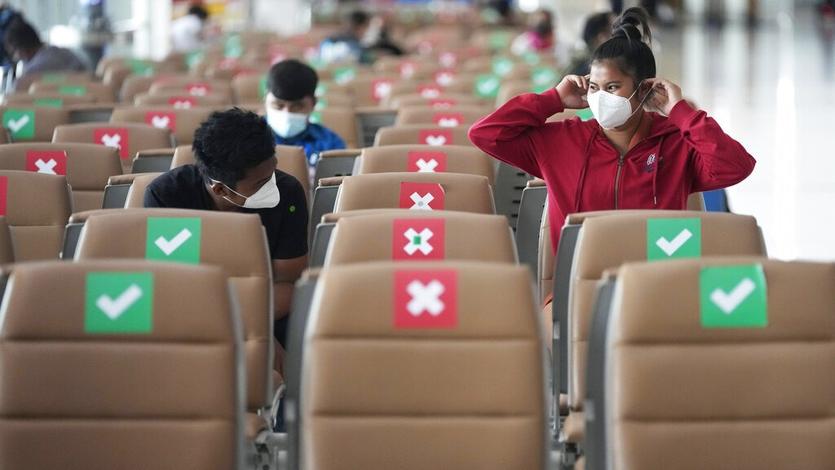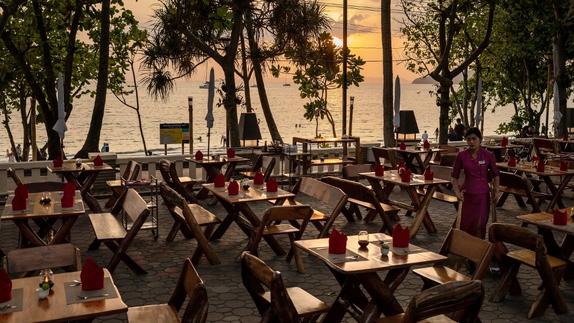 Passengers sit spaced apart while wearing face masks to help curb the spread of the coronavirus at Suvarnabhumi airport in Bangkok, Thailand, July 21, 2021. (SAKCHAI LALIT / AP)
Passengers sit spaced apart while wearing face masks to help curb the spread of the coronavirus at Suvarnabhumi airport in Bangkok, Thailand, July 21, 2021. (SAKCHAI LALIT / AP)
Thailand’s economy is on track to return to pre-pandemic levels as tourists and exports rebound, experts say, adding the government needs to make efforts to address key challenges such as inflation.
Kirida Bhaopichitr, director of the Economic Intelligence Service at the Thailand Development Research Institute, said the institute is “expecting growth this year to be around 3 percent and for next year to be around 3-3.5 percent”.
Kirida Bhaopichitr, director of the Economic Intelligence Service at the Thailand Development Research Institute, said the institute is “expecting growth this year to be around 3 percent and for next year to be around 3-3.5 percent”
Kirida told China Daily the main factors driving growth include a rebound in exports, tourism and domestic private consumption.
Citing increased tourism and favorable signs of economic recovery in the second quarter, Thai Prime Minister Prayuth Chan-ocha said on Aug 2 that the country’s economy will grow 3.3 percent in 2022 and 4.2 percent next year, surpassing the 2018 figure of 4.1 percent.
Thailand’s Joint Standing Committee on Commerce, Industry and Banking said on Aug 3 that it expects the economy to grow 2.75-3.5 percent this year, with exports expected to increase 6-8 percent this year, according to Reuters.
READ MORE: Thailand discourages discounts, wants high value tourists
Juthathip Jongwanich, associate professor of the Faculty of Economics and the International Competitiveness Research Unit at Thammasat University in Thailand, said exports grew by 12.7 percent in the first half of this year, higher than earlier estimates of 4-5 percent.
She expects exports to continue growing although it may slow down to less than 10 percent in the second half of 2022.
Amonthep Chawla, head of Research Office and Wealth Research and Advisory at CIMB Thai Bank, said Thailand appeared to have a good opportunity from rebounding tourism, with the number of tourists expected to reach 10 million this year and 20 million in 2023.
 This photo taken on Feb 6, 2020 shows a waitress cleaning an area at a nearly empty restaurant at Ao Nang beach in Krabi province, Thailand. (NICOLAS ASFOURI / AFP)
This photo taken on Feb 6, 2020 shows a waitress cleaning an area at a nearly empty restaurant at Ao Nang beach in Krabi province, Thailand. (NICOLAS ASFOURI / AFP)
“Most tourists this year are from Europe, the Middle East, nearby Southeast Asia and East Asia,” Amonthep, also the bank’s executive vice-president, told China Daily. “We could expect tourists from China next year.”
Amonthep said Thailand’s economy is still among the slowest in the Association of Southeast Asian Nations due to its heavy reliance on tourism. He said the number of tourists could only return to a pre-pandemic level of about 40 million in 2024.
Amonthep Chawla, head of Research Office and Wealth Research and Advisory at CIMB Thai Bank, said Thailand’s economy is still among the slowest in the Association of Southeast Asian Nations due to its heavy reliance on tourism. He said the number of tourists could only return to a pre-pandemic level of about 40 million in 2024
Kirida from the Thailand Development Research Institute said high prices will be a major challenge for Thailand’s economy.
“For this year, we expect inflation to be around 6.5 percent … but for next year it will be much lower and could go down to 2 or 2.5 percent,” said Kirida, noting high inflation would reduce individuals’ purchasing power.
Thailand’s consumer price index, a main gauge of inflation, rose 7.61 percent year-on-year in July, according to data from the Ministry of Commerce. This was down from the 14-year high of 7.66 percent recorded in June.
ALSO READ: Thailand says tourism industry may not recover until 2026
During the first seven months of 2022, Thailand’s CPI increased 5.89 percent compared with the previous year, with the ministry saying it expects the national CPI to increase 5.5-6.5 percent for the whole year. The central bank set its annual target range for 2022 at 1-3 percent.
Amid high inflation, Thailand’s central bank on Aug 10 raised its key interest rate for the first time in about four years, by 25 basis points to 0.75 percent.
Commercial banks in Thailand were urged not to rush to follow the increase because the economy has yet to fully recover, Thai Finance Minister Arkhom Termpittayapaisith said on Aug 10, noting exports will continue to rise amid the global food crisis.
Kirida said she expects another rate hike of 25 basis points in October, meaning a full-year increase of 0.5 percentage points.
Some organizations, such as Citibank, expected the policy rate to be raised three times this year, in increments of 0.25 percent.
“Next year, if the United States continues to raise its policy rate, then we could continue to increase our policy rate as well,” said Kirida. “We will not be as aggressive as the US, but it will still be an uptrend.”
Amonthep from CIMB Thai Bank said the pace of recovery in Thailand is not even, as low-income households and small and medium-sized enterprises in small provinces are not benefiting from a recovery in the tourism sector, while rising cost of materials in farms lowers the purchasing power among the poor.
“Going forward, the government could continue injecting cash transfers to the poor and support rising cost of living among middle-low-income households,” said Amonthep.
In formulating policy, the government also needs to consider a gradual increase in interest rates, a stabilizing baht, and debt restructuring, said Thammasat University’s Juthathip.


